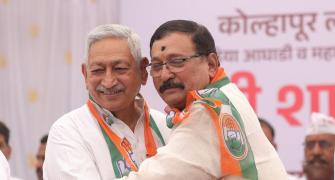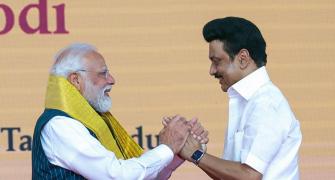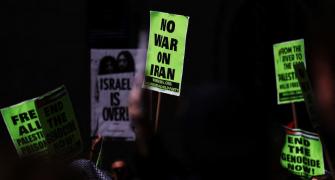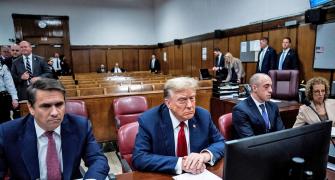Despite the American disapproval, India has begun moves to improve trade and defence ties with the Islamic republic, notes Harsh V Pant.
Days after an International Atomic Energy Agency report raised concerns about the organisation's ability to monitor parts of Iran's nuclear programme and suggested that Iran is steadily stockpiling enriched uranium, India has decided to make an attempt to get an exemption for the shipping company Iran-o-Hind from the UN sanctions.
This 35-year old Indo-Iranian joint venture might just become a symbol of a new phase in India's ties with Tehran that have been in a dormant state for some time now.
Ever since the United States and India started to transform their ties by changing the global nuclear order to accommodate India, Iran has emerged as a litmus test that India has had to pass from time to time to the satisfaction of US policy makers.
India's traditionally close ties with Iran have become a factor influencing a US-India partnership. India-Iran ties have been termed variously as an 'axis', a 'strategic partnership', and even an 'alliance'.
However, the American focus on India-Iran ties has been highly disproportionate to the realities of this relationship, a result more of the exigencies of domestic politics than of regional political realities.
And when the choice emerged between Iran and the US, India ended up siding with the US. But now the evolving strategic milieu in AfPak and China's growing reach in Iran is forcing New Delhi to re-think its approach towards Tehran.
Ignoring Washington, India has recently signed several agreements with Iran, including an air services agreement and memorandum of understanding in new and renewable energy aimed at increasing bilateral trade from $15 billion to $30 billion.
Economic cooperation in priority areas like oil, gas, petrochemicals, pharmaceuticals, and textiles has been identified as important for this endeavour.
Plans are afoot for greater maritime cooperation and Iran has already joined the Indian Navy's annual initiative, the Indian Ocean Naval Symposium.
More significantly, the two sides have decided to hold 'structured and regular consultations' on the issue of Afghanistan.
The Obama administration's intent of moving out of Afghanistan has managed to signal to Indian adversaries that they can shape the post-American ground realities to serve their own ends.
Both India and Iran are unlikely to accept an Afghanistan that serves as a spring board for projecting Pakistan military's interests.
In the second ministerial level visit from Iran to India in less than a month, the Iranian deputy foreign minister was in India in early August to coordinate the India-Iran approach towards Afghanistan.
Over the last several years, India has repeatedly voted in favour of IAEA resolutions condemning Iran's nuclear behaviour.
Though Indian Prime Minister Manmohan Singh has been categorical in his assertion that a nuclear Iran is not in Indian interests, the Indian government has been keen in recent months to underline that it favours dialogue and diplomacy as means of resolving the Iranian nuclear crisis.
India has underlined that unilateral sanctions on Iran will hurt India, expressing its disapproval of sanctions by individual countries that restrict investments by third countries in Iran's energy sector.
As Indian Foreign Secretary Nirupama Rao recently made clear, India is 'justifiably concerned that the extra-territorial nature of certain unilateral sanctions recently imposed by individual countries, with their restrictions on investment by third countries in Iran's energy sector, can have a direct and adverse impact on Indian companies and more importantly, on our (India's) energy security and our attempts to meet the development needs of our people.'
Despite Western sanctions, the Indian government is encouraging Indian companies to invest in the Iranian energy sector so that economic interests can underpin India-Iran political realignment.
The issue of the $7.5 billion Iran-Pakistan-India pipeline is also back on the agenda as India remains keen to gain access to Iranian energy resources. Not only has Pakistan already signed the deal with Iran, China is starting to make its presence felt in Iran in a big way.
It is now Iran's largest trading partner and is undertaking massive investments in Iran, rapidly occupying the space vacated by Western firms.
With international pressure on Iran to abandon its nuclear program mounting in the last few years, Western companies began reducing their dealings with Tehran further, and Iran turned more to China for investment in its oil and gas sectors.
Iran hopes to defeat its global isolation by courting China and China can make use of Iran's energy resources without any real competition.
Ever since the United Nations Security Council has been imposing sanctions on Iran, India has enforced all UN measures against Tehran.
While its energy interests in Iran have suffered as a result, China, a member of the Security Council, has been able to pursue its energy interests with Iran without much difficulty.
Iran was the third largest exporter of crude oil to China last year, accounting for about 11 percent of China's total crude imports.
India is right to feel restless about its own marginalisation in Iran despite its civilisational ties with the country.
New Delhi has now indicated that it will soon be resuming negotiations for independently importing natural gas from Iran via a sea pipeline.
India is trying to maintain a balance between preserving its strategic interests in Iran and adhering to its global obligations.
Though New Delhi's strategic room to maneuver in Tehran will remain limited so long as Tehran does not find a modus vivendi with the West on the nuclear question, there is no reason why India should not keep all its options open.







